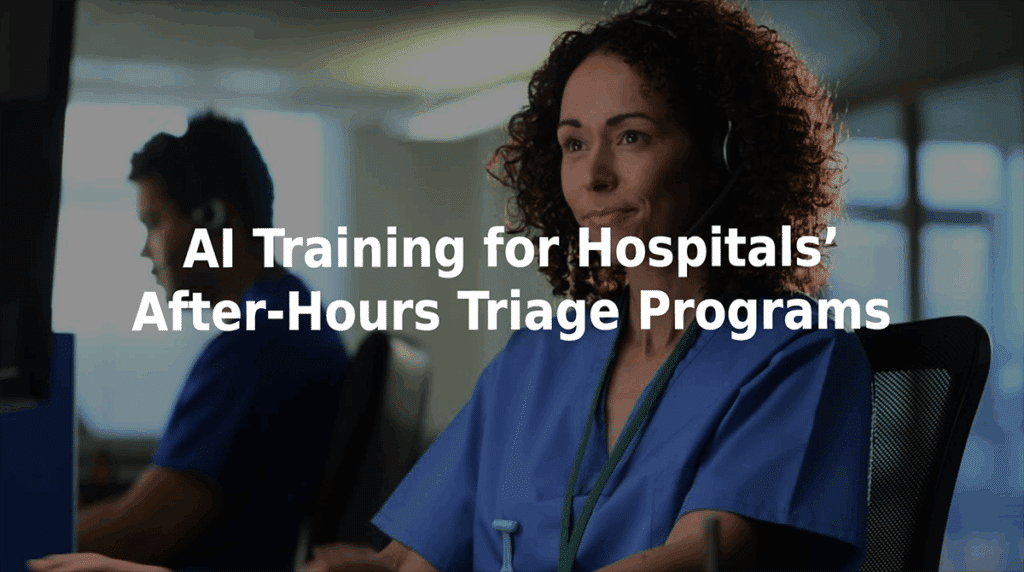AI Training for Hospitals’ After-Hours Triage Programs
In modern health care, after-hours triage is essential for giving patients access to safe, consistent guidance when their doctors’ offices are closed. But what ensures that the nurses providing that triage are confident, competent, and ready for any scenario? TriageLogic® answers that question with AI training for hospitals’ after-hours triage programs, powered by its advanced simulation module known as Triage Assist.
This training simulator prepares nurses for real-world calls by helping them sharpen their judgment, improve the accuracy of their documentation, and deliver better patient outcomes. It’s part of how we ensure that our Nurse Triage On Call service provides the highest standards of care to hospitals, clinics, and health systems nationwide.
The Challenge: Maintaining Consistent Quality in After-Hours Care
Hospitals and medical groups rely on after-hours nurse triage to extend patient care beyond normal office hours. However, training nurses to handle the full range of potential patient calls — especially those that involve subtle or complex symptoms — can be difficult and time-consuming.
Traditional methods often depend on manual instruction or live observation, both of which limit the number of scenarios nurses can safely practice. This can leave gaps in experience and confidence, especially for rare but critical situations that require quick, accurate decision-making.
That’s why TriageLogic developed Triage Assist, an AI training platform designed specifically to prepare nurses for the unpredictable world of after-hours patient triage.
Triage Assist: A Closer Look
Triage Assist uses the power of artificial intelligence to simulate real-life patient encounters, giving nurses a safe and controlled space to practice clinical triage.
Through these simulations, nurses can:
- Practice documenting patient interactions in triage software accurately and efficiently.
- Apply the correct nurse triage protocols to assess symptoms based on Schmitt-Thompson guidelines.
- Strengthen listening and communication skills for patients in distress.
- Build confidence and empathy through exposure to a diverse range of patient personalities and conditions.
Our AI module progresses from simple to complex cases, helping nurses build skill and muscle memory for every type of call.
Why AI Training Improves Triage Outcomes
Studies consistently show that nurse confidence and competence directly influence patient outcomes. AI training for hospitals’ after-hours triage programs not only accelerates onboarding, but also enhances overall triage quality.
By practicing in a risk-free environment, nurses can make mistakes, learn from them, and refine their approach before handling real patient calls. This leads to faster decision-making, improved documentation, and greater consistency across your triage team.
Triage Assist also helps hospital managers streamline their oversight. The module automatically tracks each nurse’s performance, generating reports and transcripts that supervisors can review to identify strengths and areas for improvement.
This transforms training from a reactive process into a continuous cycle of measurable quality improvement.
Benefits for Hospitals and Healthcare Systems
- Faster Nurse Onboarding: Reduce the time and resources needed to train new triage staff.
- Improved Accuracy: AI-driven simulations ensure standardized protocol use and precise call documentation.
- Continuous Learning: Ongoing practice helps maintain high performance and protocol adherence.
- Better Patient Outcomes: Confident, well-prepared nurses make safer triage decisions that reduce unnecessary ER visits.
- Manager Efficiency: Supervisors can monitor results, customize feedback, and focus coaching where it’s needed most.
- Powerful Integration: Triage Assist can integrate with existing platforms, including Epic’s triage module, making implementation simple and scalable.
By investing in AI training, healthcare organizations can equip every triage nurse with the knowledge and skills to deliver high-quality care, no matter how complex the call.
How AI Supports TriageLogic’s Nurse Triage On Call Service
TriageLogic’s medical call center, Nurse Triage On Call, is built on a foundation of clinical excellence. Nurses in this service are trained with Triage Assist, which allows them to practice realistic, simulated calls before interacting with actual patients.
This leads to:
- Consistent use of evidence-based Schmitt-Thompson protocols.
- Professional, empathetic communication with every patient caller.
- Detailed, EHR-ready documentation that supports follow-up and continuity of care.
For hospitals and medical practices that rely on outsourced nurse triage, this level of preparation means greater reliability, lower liability, and stronger patient satisfaction.
Why TriageLogic Leads in AI-Powered Triage Innovation
For more than a decade, TriageLogic has been advancing nurse triage through technology, clinical expertise, and data-driven training. With Triage Assist, we’ve combined artificial intelligence with hands-on clinical experience to create a smarter, safer, and more effective way to train triage nurses.
This AI-powered approach allows hospitals to expand after-hours coverage with complete confidence, knowing that every nurse represents their organization with professionalism and care.
Advance Your After-Hours Triage With AI
Your patients deserve nurses who are confident, skilled, and prepared for anything — and your hospital deserves a training program that makes that possible.
With AI training for hospitals’ after-hours triage programs, you’ll have ready access to continuous clinical improvement.
If you’d like to learn more about this training module and how it works, we’d love to show you! Contact us today to schedule a free demo! (800) 723-4290




